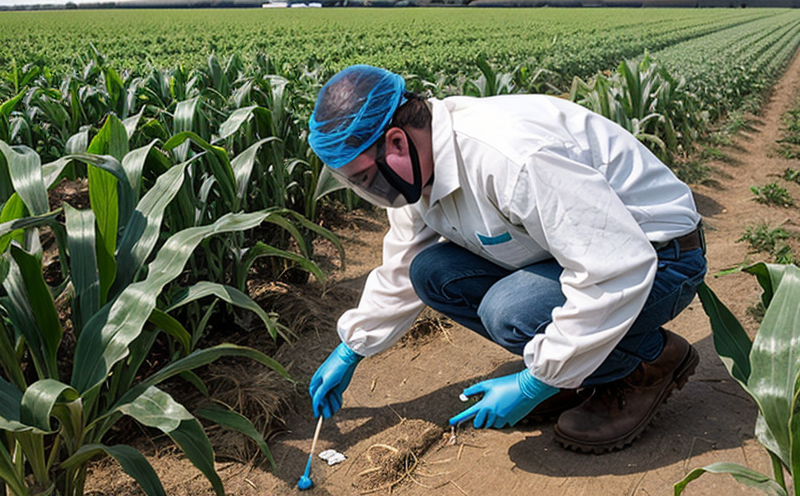Bentazon Residue Testing in Crops
Bentazon is a widely used herbicide that belongs to the phenoxycarboxylic acid group. It is primarily employed for broad-spectrum weed control, particularly effective against grasses and broadleaf weeds. Due to its versatility and efficiency, Bentazon has become an integral part of many agricultural practices globally. However, like other pesticides, Bentazon can leave residues in crops which may pose risks if not properly managed.
Our service focuses on providing accurate and reliable testing for Bentazon residue levels in various crops. This is crucial to ensure compliance with international standards and regulations, thereby safeguarding public health and environmental sustainability. The process involves meticulous sample collection, thorough preparation, and rigorous analysis using advanced analytical techniques such as Liquid Chromatography-Mass Spectrometry (LC-MS/MS).
The standard method for Bentazon residue testing is outlined in ISO 21967:2018 which provides detailed instructions on sampling, extraction procedures, clean-up methods, and quantification. Compliance with these standards ensures consistent results across different laboratories worldwide.
Sample preparation typically includes rinsing the crop sample with a suitable solvent followed by thorough mixing. Afterward, the mixture undergoes filtration before undergoing liquid-liquid partitioning or solid-phase extraction. This step is critical in reducing matrix effects and increasing analytical sensitivity.
The actual quantification process leverages LC-MS/MS technology for its high precision and selectivity. Calibration curves are established using known concentrations of Bentazon, ensuring accurate determination within the linear range. Detection limits vary depending on the crop type but generally fall between 0.1 ppm to 1.0 ppm.
Our laboratory adheres strictly to ISO/IEC 17025 standards, guaranteeing quality control and assurance throughout every stage of testing. We employ experienced analysts trained specifically in pesticide residue analysis ensuring reliable outcomes each time.
International Acceptance and Recognition
- The results from our Bentazon residue tests are internationally recognized by major regulatory bodies including the European Food Safety Authority (EFSA), United States Environmental Protection Agency (US EPA), and World Health Organization (WHO).
- We comply with global standards such as Codex Alimentarius, which sets maximum limits for pesticide residues in food commodities.
Eurolab Advantages
At Eurolab, we pride ourselves on delivering exceptional services tailored to meet the unique needs of our clients. Our team comprises highly qualified professionals who possess extensive experience in agricultural and forestry testing.
- We offer flexible scheduling options allowing you to choose a time that suits your schedule without compromising quality.
- Our advanced laboratory facilities equipped with state-of-the-art instruments ensure precision and accuracy in all our tests.
Environmental and Sustainability Contributions
Pesticide residue testing plays a pivotal role in promoting sustainable agricultural practices by helping farmers make informed decisions about their use of Bentazon. By identifying residual levels, we assist them to adopt safer handling methods reducing potential environmental impacts.
- Reduces the risk of water contamination from improper application leading to better protection of aquatic ecosystems.
- Promotes efficient farming practices minimizing unnecessary pesticide usage enhancing overall soil quality and biodiversity.





